Basics of the Faith Series (39 vols.)
Digital Logos Edition
Overview
With this collection, you’ll get 37 volumes of P&R’s Basics of the Faith series. Covering questions from “Am I called?” to “What is a true Calvinist?” to “How do we glorify God?”, these accessible booklets introduce readers to basic Reformed doctrine and practice. With clarity and concision top Reformed teachers speak to complex theological issues as well as practical challenges of Christian living.
Contributors including Philip G. Ryken, J.V. Fesko, Eric Alexander, and Bryan Chapell analyze essential topics, providing helpful insights grounded in Scripture. Their rigorous, yet concise, responses to a comprehensive array of questions provide great overviews that are helpful for both those learning “the basics of the faith” as well as those teaching them. Throughout this series, you’ll find a wealth of wisdom and examples for instructing others, as these skilled communicators model effective ways to address tough questions.
In the Logos edition, the Basics of the Faith series is enhanced by amazing functionality. Scripture citations link directly to English translations, and important terms link to dictionaries, encyclopedias, and a wealth of other Reformed resources in your digital library. Perform powerful searches to find exactly what you’re looking for. Take the discussion with you using tablet and mobile apps. With Logos Bible Software, the most efficient and comprehensive research tools are in one place, so you get the most out of your study.
This title is included in the following collections
You can save when you purchase this product as part of a collection.
2025 Reformed Gold
$849.99$679.992025 Reformed Platinum
$1,499.99$1,199.99P&R Master Bundle (127 vols.)
$1,703.34$1,359.992025 Reformed Diamond
$2,999.99$2,249.99
- $4,749.99$3,562.49
- $23,999.99$17,999.99

Key Features
- Contains 37 volumes of the Basics of the Faith series
- Provides essential teaching on Reformed doctrine and practice
- Presents clear and concise discussion from top Reformed teachers
- Models effective ways to address a wide array of challenging questions
Praise for the Print Edition
The Basics of the Reformed Faith series of booklets provides us with brief, clear, accurate and edifying introductions to key aspects of Christian life and experience. They are biblically sound, well researched, and written by faithful pastor-teachers.
—Ligon Duncan, senior minister, First Presbyterian Church, Jackson, MS
P&R Publishing is to be commended for this series of booklets that are intentionally biblical and Reformed in content.
—Charles Dunahoo, coordinator, Committee for Christian Education and Publications, Presbyterian Church in America
Product Details
- Title: Basics of the Faith Series
- Series: Basics of the Faith
- Publisher: P&R
- Volumes: 37
- Pages: 1,359
- Christian Group: Reformed
- Resource Type: Introductions
Individual Titles
- Am I Called? by George W. Robertson
- How Do We Glorify God? by John D. Hannah
- How Our Children Come to Faith by Stephen Smallman
- Is Jesus in the Old Testament? by Iain M. Duguid
- What Are Election and Predestination? by Richard D. Phillips
- What Are Spiritual Gifts? by Vern S. Poythress
- What Happens after Death? by Richard D. Phillips
- What Is a Reformed Church? by Stephen Smallman
- What Is a True Calvinist? by Philip Ryken
- What Is Biblical Preaching? by Eric J. Alexander
- What Is Church Government? by Sean Michael Lucas
- What Is Discipleship? by Stephen Smallman
- What Is Evangelism? by George W. Robertson
- What Is Faith? by Guy M. Richard
- What Is Grace? by Sean Michael Lucas
- What Is Hell? by Christopher W. Morgan and Robert A. Peterson
- What Is Justification by Faith Alone? by J.V. Fesko
- What Is Man? by A. Craig Troxel
- What Is Mercy Ministry? by Philip Ryken
- What Is Perseverance of the Saints? by Michael A. Milton
- What Is Providence? by Derek Thomas
- What Is Regeneration? by Matthew M. Barrett
- What Is Spiritual Warfare? by Stanley D. Gale
- What Is the Atonement? by Richard D. Phillips
- What Is the Bible? by Guy Prentiss Waters
- What Is the Christian Worldview? by Philip Ryken
- What Is the Doctrine of Adoption? by Michael A. Milton
- What Is the Incarnation? by William B. Evans
- What Is the Lord’s Supper? by Richard D. Phillips
- What Is the Trinity? by David F. Wells
- What Is True Conversion? by Stephen Smallman
- What Is Vocation? by Stephen J. Nichols
- What Is Worship Music? by Paul S. Jones
- Why Believe in God? by Daniel R. Hyde
- Why Do We Baptize Infants? by Bryan Chapell
- Why Do We Have Creeds? by Burk Parsons
- Why Do We Pray? by Stanley D. Gale
- Why God Gave Us a Book? by Gene Edward Veith
- What Is Resurrection? by Joel R. Beeke

George Robertson explains the call to ministry and ways to assess a call. He also examines the nature of ministry itself and helps us to evaluate our gifts for service.
Ultimately inspiring. This gem on assessing one’s calling to the ministry . . . will provide sound guidance and joyful affirmation.
—Bryan Chapell, senior pastor, Grace Presbyterian Church, Peoria, IL
Highly readable and intuitively pastoral. . . . Anyone considering seminary should read this.
—Michael A. Milton, chancellor, Reformed Theological Seminary
George W. Robertson is the senior pastor of First Presbyterian Church of Augusta, Georgia.

The simple truth is that we were created for one purpose: God’s glory. In a time when so many are seeking a reason to live, this booklet offers a concise understanding of God’s desire to restore his nature to us, renewing our souls, so that we may reflect his glory in our words, our actions, and our very being.
This short book helps Christians to understand what it means to glorify God, and how that affects our everyday lives. Presented in an easy-to-understand booklet format, this text is part of the Basics of the Reformed Faith series, which introduces lay readers to the distinct features of Reformed theology.
John D. Hannah is research professor of theological studies and distinguished professor of historical theology at Dallas Theological Seminary. He earned his ThM and ThD from Dallas Theological Seminary, his MA from Southern Methodist University, PhD from the University of Texas at Dallas, and did postdoctoral study at Yale University.
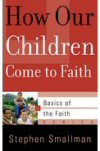
Stephen Smallman has written a booklet to Christian parents about how to raise their children in a spirit of faith rather than anxiety. It all begins when parents bring their children to Jesus for his blessing. He then explains the meaning of regeneration and conversion as it relates to children raised in Christian families.
Stephen Smallman is assistant pastor at New Life Presbyterian Church in Pennsylvania. He earned his MA in Bible and Education from Bob Jones University and his MDiv in pastoral ministry from Covenant Theological Seminary. He served as pastor of McLean Presbyterian Church in Virginia for 30 years, executive director at World Harvest Mission, and as instructor and faculty coordinator at CityNet Ministries.
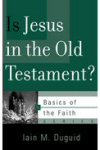
Many Christians find the Old Testament to be inaccessible and ultimately ignore large parts of it—often because they simply are not sure what to do with it. Yet Iain Duguid maintains that the Old Testament is for Christians too. What is more, Christ is present throughout the Old Testament—in fact, when rightly interpreted, the whole book is about him. Duguid explores what it means to rightly see Christ in the Old Testament and looks at some specific ways the Old Testament prepares us to see and understand Christ’s ministry in the Gospels.
If reading the first two thirds of your Bible feels like wandering through a foreign country, Iain Duguid’s Is Jesus in the Old Testament? offers hope. Not only does he demonstrate that the Old Testament is all about Jesus, he shows how the ancient Scriptures’ promises and longings find fulfillment in our Savior as the new Adam, new Israel, and new David. This booklet will enrich your appreciation of the events and words by which God forecasted Christ’s redemptive mission before his arrival and will deepen your faith and wonder.
—Dennis E. Johnson, professor of practical theology, Westminster Seminary California
Iain M. Duguid (PhD, University of Cambridge) is professor of Old Testament and religion at Grove City College in Grove City, Pennsylvania, and visiting professor of Old Testament at Westminster Seminary California. He is copastor of Christ Presbyterian Church (ARP) in Grove City. He has written numerous works of biblical exposition, including Ezekiel in the NIV Application Commentary series, Numbers in the Preaching the Word series, and Esther & Ruth in the Reformed Expository Commentary series.
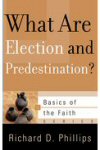
The doctrines of election and predestination are often misunderstood outside Reformed circles. This booklet clearly and simply explains these truths, showing their biblical basis and practical application.
Richard D. Phillips (MDiv, Westminster Theological Seminary) is the senior minister of Second Presbyterian Church of Greenville, South Carolina. He is a council member of the Alliance of Confessing Evangelicals, chairman of the Philadelphia Conference on Reformed Theology, and coeditor of the Reformed Expository Commentary series.

God empowers us with spiritual gifts to serve others. Our ideas about gifts need to be in harmony with Scripture but how can we know for sure? In this booklet, Vern S. Poythress guides us through the issues.
Vern S. Poythress earned his MLitt from the University of Cambridge, PhD from Harvard University, and DTh from the University of Stellenbosch. He is professor of New Testament interpretation at Westminster Theological Seminary in Philadelphia.
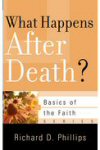
Death is real, and its reality hurts us. Yet our journey does not end when we breathe our last on earth. How do we as Christians come to grips with death? What can we expect afterward? An Army officer turned pastor, Richard Phillips tackles this difficult topic with clarity and care. After describing the proper response to death modeled by Jesus and noted Christians, he provides a biblically faithful explanation of what we can expect in the actual experience of death, the final judgment, and our eternal state.
This is a thoroughly biblical tool for the thorny work of leading congregants through the dying process or encouraging those left behind.
—Howard Eyrich, pastor of counseling ministry, Briarwood Presbyterian Church
Richard D. Phillips (MDiv, Westminster Theological Seminary) is the senior minister of Second Presbyterian Church of Greenville, South Carolina. He is a council member of the Alliance of Confessing Evangelicals, chairman of the Philadelphia Conference on Reformed Theology, and coeditor of the Reformed Expository Commentary series.
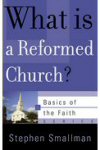
This brief text provides introduction to the Reformed view of Scripture, divine sovereignty, the covenant of grace, the law of God, the church, and the kingdom of God.
A clear, biblical, and beautiful summary of Calvinism or the Reformed Faith. This could be helpful to a new Christian as well as older Christians . . . easy to read and accurate.
—Charles Dunahoo, coordinator, Committee for Christian Education and Publications, Presbyterian Church in America
Stephen Smallman is assistant pastor at New Life Presbyterian Church in Pennsylvania. He earned his MA in Bible and Education from Bob Jones University and his MDiv in pastoral ministry from Covenant Theological Seminary. He served as pastor of McLean Presbyterian Church in Virginia for 30 years, executive director at World Harvest Mission, and as instructor and faculty coordinator at CityNet Ministries.
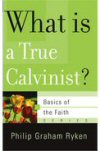
This practical introduction to Reformed spirituality encourages a God-centered mind, penitent spirit, grateful heart, submissive will, holy life, and glorious purpose.
Philip Graham Ryken is president of Wheaton College and Bible teacher for the Alliance of Confessing Evangelicals. He speaks nationally on the radio program Every Last Word. Dr. Ryken was educated at Wheaton College, Westminster Theological Seminary, and the University of Oxford, where he received his doctorate in historical theology.
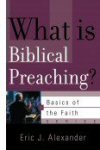
The booklet is a brief account of the main principles on which expository preaching is based.
When seminary students ask me to name contemporary expositors whose preaching is most worthy of emulation, Eric Alexander’s name always comes instantly to mind. He is one of the finest biblical preachers I have ever listened to—never straying from his text, always giving proper weight to each point in the passage—and passionately, persuasively driving home the truth of God’s Word with incredible power but seemingly effortless delivery. His insights on preaching are pure gold, and this book is a real treasure.
—John MacArthur, president, The Master’s College and The Master’s Seminary
Eric J. Alexander is a minister of the Church of Scotland. From 1977 to 1997 he was senior minister of St. George’s Tron Church in the center of Glasgow. Since then, he has traveled widely preaching and teaching at conferences and seminaries. On two occasions, he was the expositor at the Triennial Urbana Conference of IVCF.
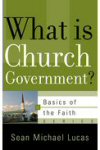
Many people are Presbyterian without having thought through what stands at the heart of Presbyterianism: church polity. This booklet serves as a basic introduction to Presbyterian church government useful for new members or officers training classes as well as those investigating Presbyterianism for the first time.
Sean Michael Lucas is associate professor of church history and chief academic officer at Covenant Seminary, St. Louis. Lucas earned his MA in theology/church history from Bob Jones University, Greenville, SC and a PhD in historical and theological studies/American Reformed tradition from Westminster Theological Seminary, Philadelphia, Pennsylvania.
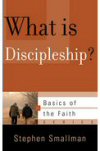
Using 10 basic building blocks, Stephen Smallman gives us a framework for local congregations to design and implement a theologically sound strategy for disciple-making.
There are many books on discipleship these days. However, few are written from the Reformed perspective and rich pastoral experience that this book represents. If you are looking for a book that draws practical principles of discipleship from the triumphant truths of the gospel, What Is Discipleship? will inspire as it informs.
—Michael Horton, J. Gresham Machen Professor of Systematic Theology and Apologetics, Westminster Seminary California
Stephen Smallman is assistant pastor at New Life Presbyterian Church in Pennsylvania. He earned his MA in Bible and Education from Bob Jones University and his MDiv in pastoral ministry from Covenant Theological Seminary. He served as pastor of McLean Presbyterian Church in Virginia for 30 years, executive director at World Harvest Mission, and as instructor and faculty coordinator at CityNet Ministries.

Is there one “right way” to evangelize? In this brief text, George Robertson answers describes five authoritative approaches to evangelism, giving us flexibility as we winsomely present the good news that can answer any need.
Robertson combines Scripture, history, present experience, pastoral insight, and—most of all—a compassionate heart to give us a compelling vision of what the good news of Jesus Christ is and how it can be shared with love, wisdom, and integrity.
—Bryan Chapell, senior pastor, Grace Presbyterian Church, Peoria, IL
George W. Robertson is the senior pastor of First Presbyterian Church in Augusta, Georgia.
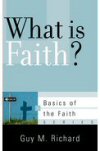
We are commanded to have a reason for our faith. Can you explain yours? Guy Richard shows us what Christian faith truly is as he examines it from biblical, theological, and historical perspectives.
Guy Richard is senior minister of First Presbyterian Church in Gulfport, Mississippi.

The Reformed faith has, at its center, the doctrines of grace—in its hymns, exposition, and theology. Many Christians talk about “grace" with little understanding, this booklet approaches that problem.
Dr. Sean Lucas extols the wonders of grace with insight that makes the gospel powerful and love that makes it sweet. Lucas has a wonderful ability to tie theological insight to contemporary allusions that make the truths of grace foundational for faithfulness today.
—Bryan Chapell, senior pastor, Grace Presbyterian Church, Peoria, IL
Sean Michael Lucas is senior pastor of First Presbyterian Church in Hattiesburg. He earned his PhD at Westminster Theological Seminary.
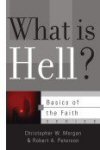
Would a loving God really send good people to hell? What does the Bible actually teach about hell? How should believing in hell affect us?
Here Christopher Morgan and Robert Peterson set forth a clear biblical theology of hell, facing the hard realities and avoiding silly stereotypes by conveying what the Bible says about hell with integrity, intelligence, and compassion. They address the major questions people have about this subject and apply what the Bible has to say about it to Christian living.
We are scared of the subject. Jesus wasn’t. He knew that nothing could be less gracious than hiding the reality of hell from those destined for its misery apart from his mercy. Trying to scare people into faith is vain, but denying them knowledge of the consequences of sin is unloving. Morgan and Peterson face the hard realities and avoid silly stereotypes by saying what the Bible says about hell with integrity, intelligence, and compassion.
—Bryan Chapell, senior pastor, Grace Presbyterian Church, Peoria, IL
Robert A. Peterson is professor of systematic theology at Covenant Theological Seminary in St. Louis.
Christopher W. Morgan is professor of theology and dean of the School of Christian Ministries at California Baptist University.
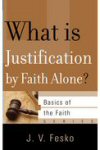
Ever since Martin Luther, the famous sixteenth-century Reformer, nailed his 95 theses to the castle door of Wittenberg, the doctrine of justification by faith alone has been one of the great truths of the Reformed faith. In this concise booklet, J.V. Fesko takes a fresh look at this critical doctrine, explaining biblical teaching, examining classic Reformed statements, and answering common questions. He explains the doctrine of justification in uncomplicated, nontechnical language.
J.V. Fesko is academic dean and associate professor of systematic theology at Westminster Seminary, California. He earned his master’s in theology from Southwestern Baptist Theological Seminary and a PhD in theology from the University of Aberdeen. He helped plant the Geneva Orthodox Presbyterian Church in Woodstock, Georgia and served as pastor from 2004 to 2009.

What does it mean to be created in God’s image, made male and female, united in body and soul? Without answers won’t understand our identity, and why we do what we do. In this brief booklet—part of the Basics of the Faith series—A. Craig Troxel provides clear exposition in a basic overview of these issues.
A. Craig Troxel is the pastor of Bethel Orthodox Presbyterian Church in Wheaton, Illinois. He is also an adjunct professor of Systematic Theology at Westminster Theological Seminary, Philadelphia.
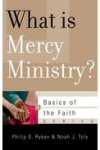
Many people around us have desperate needs, and the Holy Spirit will not let us sit by and do nothing. This booklet encourages believers to act by pursuing a mercy ministry for their church.
Philip Graham Ryken is president of Wheaton College and Bible teacher for the Alliance of Confessing Evangelicals. He speaks nationally on the radio program Every Last Word. Dr. Ryken was educated at Wheaton College, Westminster Theological Seminary, and the University of Oxford, where he received his doctorate in historical theology.
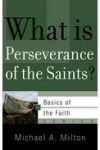
Mike Milton defines the famous “fifth point of Calvinism” and distinguishes it from other theologies (including “once saved always saved”) and encourages all of us to delight in this beautiful doctrine that brings assurance to the believer, hope for the prodigal, and glory to the Lord Jesus Christ.
Michael A. Milton is president of Reformed Theological Seminary in Charlotte, NC where he also serves as professor of practical theology. He is also an ordained minister in the Presbyterian Church in America.
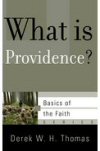
Few things distinguish Christian and secular worldviews with greater clarity than the doctrine of providence: that everything that happens is the outcome of the sovereign overruling of God. So what is Providence? In this booklet, Derek Thomas examines the providence of God by observing how the Bible explains the complex lives of men and women as well as weighing opposing viewpoints, including Open Theism and Molinistic views of “middle knowledge.”
Derek Thomas is a well-known author and is professor of systematic and practical theology at Reformed Theological Seminary. He also serves as minister of teaching at First Presbyterian Church in Jackson, Mississippi, and is the editorial director of the Alliance of Confessing Evangelicals.

Many people believe they can initiate their salvation—either through choosing to believe or on their own merits. Yet the Bible is clear that we can’t take even the first step toward reconciliation with God on our own. We are spiritually dead and can do nothing unless we are given new life.
Matthew Barrett explores the doctrine of regeneration to show us what truly happens to us when we are saved. He compares the gospel call with the effectual call and shows us how God’s gift of a new heart and new birth—not anything we have done—initiates our salvation.
The doctrine of effectual calling is at the heart of what it means to confess that Jesus Christ is the sole and sufficient Savior of spiritually dead sinners. Matthew Barrett does a great job of condensing this doctrine into a readable form that all can understand.
—Timothy George, dean, Beeson Divinity School of Samford University
Matthew M. Barrett (MDiv, PhD, Southern Baptist Theological Seminary) is assistant professor of Christian studies at California Baptist University.
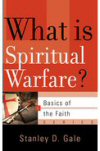
Thoroughly biblical, Stanley Gale’s brief booklet guides us from Genesis to Revelation, laying out a spiritual, yet practical guide to standing daily against Satan and his schemes. Focusing on the redemptive work of Christ, he exposes Satan’s tactics, and gives us a battle plan of resistance of standing and abiding in Christ.
What Is Spiritual Warfare? is a clear, sober, practical guide to the everyday reality of spiritual warfare. From Genesis to Revelation, Stan Gale conducts a careful reconnaissance of our unseen adversary and his diabolical tactics for deceiving, tempting, and accusing the people of God. He also shows us how to stand firm in Christ, using the simple gospel weapons that the son of God has given us to defeat the devil.
—Philip Ryken, president, Wheaton College
Stanley D. Gale serves as senior minister of the Reformed Presbyterian Church in West Chester, Pennsylvania. He has authored a number of works on spiritual warfare, including Warfare Witness: Contending with Spiritual Opposition in Everyday Evangelism.

Five succinct sections establish the importance of Jesus’ atonement for faith, ministry, and life. This brief booklet is an ideal tool for small group discussions on an increasingly important subject.
Richard D. Phillips (MDiv, Westminster Theological Seminary) is the senior minister of Second Presbyterian Church of Greenville, South Carolina. He is a council member of the Alliance of Confessing Evangelicals, chairman of the Philadelphia Conference on Reformed Theology, and coeditor of the REC series.

God’s Word is the sword we wield in our day-to-day spiritual warfare—which means our beliefs about it are of practical importance. Losing confidence in the power and authority of Scripture can devastate us and leave us wide open to attack.
Here Guy Prentiss Waters invites readers to get a handle on God’s word. Defining terms such as revelation, inspiration, and inerrancy, he clears away common misconceptions about them. By addressing leading objections that Christians encounter today, he equips us to assess and respond to criticisms of this vital doctrine.
Basics of the Faith booklets introduce readers to basic Reformed doctrine and practice. On issues of church government and practice they reflect that framework—otherwise they are suitable for all church situations.
Guy Waters’ answer to the foundational question, What Is the Bible?, is a theological gem. It sparkles with clarity, delighting the heart of faith.
—Peter A. Lillback, president, Westminster Theological Seminary, Philadelphia, PA
This booklet must be read by every church member and believed by every church officer for the health of the church and the advance of Christ’s cause.
—Sean Michael Lucas, senior pastor, First Presbyterian Church
Guy Prentiss Waters (BA, University of Pennsylvania; MDiv, Westminster Theological Seminary; PhD, Duke University) is professor of New Testament at Reformed Theological Seminary in Jackson, Mississippi. Waters is the author of Justification and the New Perspective on Paul: A Review and Response. He is an ordained minister of the Presbyterian Church in America. He is also a member of the Society of Biblical Literature and the Institute of Biblical Research.

What does Christianity have to do with real life? Philip G. Ryken reveals the basis of a Christian worldview and describes how it affects one’s view of God, creation, the family, the arts, and other issues.
Philip Graham Ryken is president of Wheaton College and Bible teacher for the Alliance of Confessing Evangelicals. He speaks nationally on the radio program Every Last Word. Dr. Ryken was educated at Wheaton College, Westminster Theological Seminary, and the University of Oxford, where he received his doctorate in historical theology.
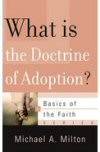
If God adopted us, in what way are we part of his family? Do we really belong to him? Mike Milton reveals the scriptural teaching that shows what our heavenly adoption truly means.
Michael A. Milton is the host of the national Bible teaching television program Faith for Living. He is also a songwriter and recording artist, and the author of numerous books and articles.
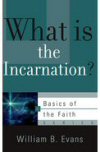
Want to make sense of the New Testament? Start with the Incarnation—a truth that goes far beyond Christmas.
The miracle of Jesus’ Incarnation touches on deep truths, speaking to the very nature of God and humanity. Evans shows how the Bible consistently supports the incarnation as actual fact. He also describes the early church’s efforts to express this great mystery and explores some key questions about the incarnation and its practical implications for our daily lives.
Concisely and accessibly, Dr. Evans demonstrates . . . how crucial [the Incarnation] is and how only the incarnate son of God could save us.
—Robert Letham, author, Union with Christ
Evans introduces us to both the teaching of Scripture and the loving reflections of some of the best minds of the Christian centuries. . . . Will stimulate even greater love for and faith in the Lord Jesus.
—Sinclair Ferguson, pastor, First Presbyterian Church
William B. Evans is Younts Professor of Bible and Religion at Erskine College in Due West, South Carolina.
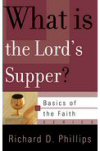
Ever since the night Jesus instituted the Lord’s Supper, this sacrament has played a central role in the faith and practice of the church. That is why it is odd that many believers think so little of the Lord’s Supper.
“They seldom observe it and assign to it little significance,” Richard D. Phillips writes. “They derive no assurance, and seek no grace, as they receive from the Lord’s table. How remarkable this is!” The goal of this booklet is to help readers understand the biblical institution of this sacrament, the theological issues surrounding it, and the pastoral considerations for administering and receiving it.
Richard D. Phillips is senior minister of First Presbyterian Church of Coral Springs in Margate, Florida. He is also the director of the Philadelphia Conference on Reformation Theology.
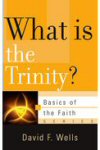
The Trinity can be difficult to grasp—if only there were a simple but thorough explanation! David Wells explores the Trinity throughout the Bible and history, defining it, and examining its implications for Christian life.
David F. Wells is distinguished senior research professor at Gordon-Conwell Theological Seminary.
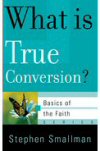
With his personal and warm style, Stephen Smallman clearly explains the roles of the Father, the Son, and the Spirit in conversion. For many people who have been converted to Christ, they are “profoundly aware” that something spiritual has happened, but just what that “something” is, is still unclear.
Whether you are a new convert or have been a believing Christian for some time, this booklet will be a help to bring you to a place of trusting yourself into the care of the Savior.
This little booklet could help solve one of the greatest problems in churches today—confusion over what it means to really become a Christian. With the sure touch of a humble Christian and a faithful pastor of many years standing, Steve Smallman has served us all well by giving us a brief and biblical treatment of conversion.
—Mark Dever, senior pastor, Capitol Hill Baptist Church, Washington, D.C.
Stephen Smallman is assistant pastor at New Life Presbyterian Church in Pennsylvania. He earned his MA in Bible and Education from Bob Jones University and his MDiv in pastoral ministry from Covenant Theological Seminary. He served as pastor of McLean Presbyterian Church in Virginia for 30 years, executive director at World Harvest Mission, and as instructor and faculty coordinator at CityNet Ministries.

For some people work is tedious and boring—something to endure until the weekend arrives. For others, work is everything—it consumes them and their time. The former find no meaning or satisfaction in their jobs, the latter find too much. Both lack an eternal perspective.
This booklet offers that framework. Work, as ordained by God, has meaning and purpose. And by understanding your own vocation, you too can say with the psalmist, “Yes, establish the work of our hands!”
Christians may hold a job, but they are called to a vocation. The loss of a Christian concept of vocation has come at a great cost, leaving many Christians unsure of how their work is to relate to their Christian faithfulness. Stephen Nichols’ new book comes right on time—affirming and explaining the Christian understanding of vocation. Even as so many people are reconsidering their career opportunities and plans for the futures, What Is Vocation? takes that question to a whole new level. In the end, faithfulness to Christ is what matters, and understanding our vocation is essential to Christian discipleship.
—R. Albert Mohler Jr., president, Southern Baptist Theological Seminary
Stephen J. Nichols (MAR and PhD, Westminster Theological Seminary; MA, West Chester University) is an associate professor at Lancaster Bible College and Graduate School.

Too much of the debate surrounding different worship styles center on personal music preferences. Paul Jones, respected author on church musicianship and worship, takes one step further back and asks the question, “What is the music for?”
Looking at biblical and historical sources, he builds a structure to help us all understand where we should be directing our energies and attention—and how to increase the value of our worshipful singing.
Paul S. Jones (DM, Indiana University) is organist and music director at historic Tenth Presbyterian Church, Philadelphia. He has composed or arranged more than 70 sacred works.

God’s existence is demonstrated three ways: from the light of conscience implanted within us, from his handiwork in the light of creation, and from the light of the canon, which presents God’s character.
Danny Hyde offers encouragement for Christians that is intelligent, winsome, and pastoral. It does not cave in to atheistic demands, but sets out from the conviction that the one true God exists and has left his testimony in this world. Christians will be encouraged to profess their faith more boldly and to call others to join them in acknowledging God as the Lord of heaven and earth.
—David VanDrunen, Robert B. Strimple Professor of Systematic Theology and Christian Ethics, Westminster Seminary California
Daniel R. Hyde (ThM, Puritan Reformed Theological Seminary) is the pastor of the Oceanside United Reformed Church in Carlsbad/Oceanside.
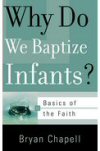
In this booklet, Bryan Chapell pastorally explains the scriptural foundation for infant baptism. He notes, “to do this I will first present the biblical support for infant baptism as I have presented it in new members’ and church officer training classes over the past 25 years. Then I will conclude by offering words of explanation that I have often used as a pastor during the administration of the ordinance. My goals are to help explain why we should baptize the infants of believing parents and also to help pastors better to know how to administer the sacrament in ways that are meaningful and helpful for their churches. Thus, I plan to present this material in terms that are accessible to laypersons and to leave technical discussions to able scholars in other books.
Bryan Chapell is senior pastor of Grace Presbyterian Church in Peoria, Illinois. He previously served as chancellor, president, and professor of practical theology at Covenant Theological Seminary in St. Louis, Missouri.
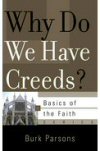
Burk Parsons insists that beliefs are important to not only know, but explain and defend. In this brief booklet, he explores our historic creeds and confessions and explains why they are desirable and necessary in our postmodern society.
Burk Parsons is associate pastor at Saint Andrew’s in Sanford, Florida, and is editor of Tabletalk magazine.
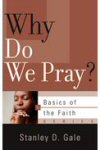
We all have questions about prayer—why pray to an all-knowing God who has ordained everything? Here is an overview of Scripture’s teaching that provides a grounded, balanced, and broad understanding of prayer.
Stanley D. Gale serves as senior minister of the Reformed Presbyterian Church in West Chester, Pennsylvania. He has authored a number of works on spiritual warfare, including Warfare Witness: Contending with Spiritual Opposition in Everyday Evangelism.

Many people look within themselves, mining their thoughts and feelings for “the voice of God.” And yet God has already spoken. The incarnate Word makes himself known in the written Word, and this communication keeps us personally connected to him. We need nothing else. Gene Veith makes this clear as he examines not only the sufficiency of God’s Word, but also the flawed thinking of those who try to add to or detract from it. This passionate, personal booklet is a call for all of us to return to God’s Word as our one and only authority in faith and practice.
Gene Edward Veith is provost and professor of literature at Patrick Henry College in Purcellville, Virginia. He is also director of the Cranach Institute at Concordia Theological Seminary, and columnist for World Magazine and Tabletalk.
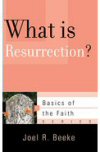
Do you long for heaven? Biblical Christianity is not fueled by a vague belief in the afterlife. Just as Christ rose from the dead, all who are united to him in faith will be raised bodily to enjoy eternal reward. But what does this mean? How will the dead be raised? When will this take place? Joel Beeke unpacks these questions to reveal the multifaceted hope of our final resurrection, a hope that transforms the way we live and allows us to face death with confidence. See afresh the significance of Christ’s rising from the dead, and renew your joy in his coming.
A terrific resource for the church. Biblically clear, theologically penetrating, and apologetically sharp, this booklet will benefit pastors and laypeople alike. Armed with Beeke’s trademark pastoral insight, What Is Resurrection? is sure to bring spiritual blessing to those who enjoy this engaging read.
—Richard D. Phillips, senior minister, Second Presbyterian Church, Greenville, SC
Joel R. Beeke is president and professor of systematic theology and homiletics at Puritan Reformed Theological Seminary.
Reviews
4 ratings

Maxim Farocanag
4/9/2024
joe_bourne1951@hotmail.com
4/2/2019

EX
3/26/2015

Nathaniel & Kelsey Stamper
2/19/2015